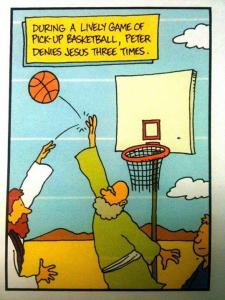For someone who is a dedicated college basketball fan and a rabid follower of the Providence College Friars, it’s been a long time since I’ve written about sports fanaticism on this blog. Through an interesting confluence of basketball and a new movie over the past week, I’ve learned a couple of things about the nature of forgiveness.
Southern New England is a hotbed of college basketball fanaticism, and the Providence College Friars are the biggest game in town in Rhode Island. In 2022 they made it to the Sweet Sixteen of the NCAA tournament, their best tournament result in 25 years. Last season they were well on their way to possibly an even better tournament when unexpectedly the wheels fell off in late February. Rumors arose that our beloved head coach of the past dozen years was being courted by another team—something that most paid little attention to because every successful coach deals with feelers from other programs every year. Our coach was a local Providence kid, regularly said that coaching the Friars was his “dream job,” and had turned down offers from more prestigious schools and programs regularly. He was for all intents and purposes the king of Providence.
But the rumors persisted and the coach regularly deflected (rather than denying) questions from media and fans. The team started playing poorly. They lost their last two home games, including being blown out on Senior Day at home by a team we had defeated earlier in the season, then lost to the worst team in the league in the first round of the league postseason tournament and were defeated in the first round of the national tournament. The day after their last loss, we learned that the coach was not only leaving but was taking the head coaching position at one of our most hated in-conference rivals. This had apparently been in the works for weeks, if not months.
In very short order, beloved royalty became despised pariah. Hate and wishes for the early demise of our former coach and the total destruction of his new program filled social media. Because of his lack of honesty, rumors ranging from the team’s late season collapse being caused by his quitting on the players to his having to leave because his wife discovered he was having an affair and said “we’re leaving or I’m divorcing you” ran rampant. Even though a new young and promising Friars coach was hired within 10 days of the previous coach’s departure, most fans seemed disinclined to forgive their former coach for abandoning them and to move on.
A late January game was circled on every fan’s calendar because this was when our hated former coach would bring his hated new team to Providence for the first time since his departure. The fans were insane (and frequently profane) and the game ended with the only acceptable result—a Friars win. The next day on a Facebook fan site, I suggested that perhaps now might be a good time for fans to stop letting our former coach live rent-free in their heads and move on.
I learned in short order that many fans had no intention of ending their hate fest and moving on. He abandoned us, he lied to us, he’s a piece of crap, and suggesting that fans move on is like telling a person whose spouse left them in order to have an affair with that person’s sibling that they should “let it go and move on.” Upon suggesting that hatred and negativity are a significant and an unnecessary drain on one’s energies, I learned that many people thrive on the negative energy of hatred. Forgive and forget? Laughable in the extreme—no true fan would ever forgive or forget! That famous coach who left the Friars thirty-seven years ago to take an NBA head coaching job? No real fans have forgotten that either—even those who were not alive when it happened.
Two days after the game, Jeanne and I saw the first three episodes of season four of “The Chosen” at the local theater complex (warning—a few minor spoilers to follow). One of the most compelling characters in the first three seasons has been Matthew. Those familiar with the gospels know that Matthew was a tax collector, but in “The Chosen” we get a chance to imagine what that actually meant in first century CE Palestine. A Jew collecting taxes for the hated occupying Romans made Matthew both more wealthy than and despised by his fellow Jews. In an inspired writers’ and directorial choice, Matthew is also on the spectrum, both brilliant (a mathematics savant) and socially awkward.
Jesus’ calling of Matthew in a late season one episode is shocking to Jesus’ other disciples, particularly Simon (who gets renamed Peter in season four). Simon is behind on his taxes, and Matthew’s unwillingness to extend the payment deadline threatens the repossession of Simon’s property and his possible imprisonment. The other disciples slowly accept Matthew’s presence among them (he has walked away from his lucrative profession, after all), but not Simon, who either ignores him or expresses overt hostility toward this perceived traitor to his people.
By the beginning of season four, Matthew has become comfortable enough with Jesus and most of the others to tell Jesus in a private conversation just how hurt he is by how Simon has treated him. Months have passed since Matthew was first called, and from Matthew’s perspective it’s well past time for Simon to stop being an asshole toward him. Matthew clearly hopes that Jesus will have a word with Simon—who clearly is the leader of the disciples—because Simon’s behavior has been “very hurtful.”
To Matthew’s consternation, Jesus is not immediately sympathetic. Who is the original aggrieved party here? Jesus asks. Who harmed who first? Matthew quickly realizes that the forgiveness ball is in his court—it is on him to apologize for his former actions to Simon. It is his responsibility to ask for Simon’s forgiveness, not his privilege to wait for Simon’s apology. Don’t you hate it when someone turns the tables on you like that?
Does Matthew ask for Simon’s forgiveness even though he believes he is the aggrieved party? If Matthew does ask for Simon’s forgiveness, what will Simon’s response be since he clearly has reason not to forgive Matthew? I’ll leave it to you to decide what should happen (then watch “The Chosen” to find out). The situation is quintessentially human. Each of us is anxious to blame the other, but few of us are willing to accept responsibility for ourselves.
In the end, forgiveness is more about the person doing the forgiving than the person being forgiven. For how long are you willing to live as the supposedly aggrieved party? For how long are you willing to presume that you have the moral high ground? In the end, each of us needs forgiveness and none of us has the moral high ground. That’s the human condition—and that’s why the story of divine forgiveness is so compelling.













